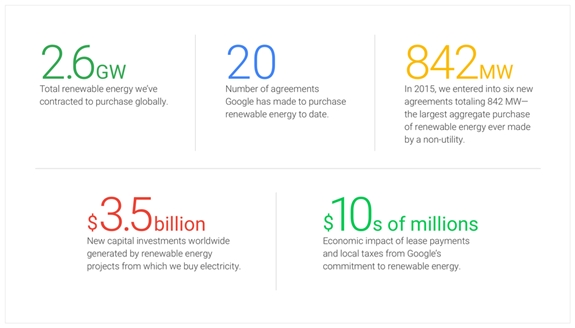Handling trillions of searches each year, Google understandably consumes a significant amount of energy to ensure it’s data centres around the world function reliably. It therefore is pretty big news then when they recently announced via a corporate blog post that they are on track to achieve 100% renewable energy use by 2017.
Now to clarify, Google isn’t building solar, wind or other renewable energy plants right next door to each data centre. In fact, as each centre remains connected to the main energy grid in the areas they are located, there isn’t a way to completely guarantee the energy being consumed is from renewable sources. However what is happening is something called a Purchase Plan Agreement (PPA) whereby Google commits to purchasing renewable energy from generators equivalent to the total amount of energy the company uses.

PPA’s are becoming more common nowadays and act more like offsets than actual direct use. Proctor & Gamble for example, recently made a PPA for wind energy and connected it to their new Tide Pur Clean laundry detergent. However, by directly committing to purchase from a renewable energy producer, these producers are guaranteed a consistent revenue stream to both maintain as well as expand their operations.
Google states that it currently is the world’s largest corporate buyer of renewable power, with commitments reaching 2.6 Gigawatts of power. To put that in perspective, Google says that is more than double the 1.21 Gigawatts of power needed for Marty McFly to return back to the future in the famous 1985 movie.
But while Google has publicly stated and demonstrated its commitment to the environment, it’s important to note that the decision to go 100% renewable isn’t based on altruism alone. The costs to produce renewable power such as wind and solar have seen significant reductions over the last few years to the point where in many cases it is now cheaper to produce and purchase renewable than traditional non-renewable energy. This is a trend that will continue given that renewable energy is ultimately based on technology as opposed to a specific commodity, and history has shown that as technologies advance, costs associated with those technologies come down. When you consume as much energy as Google does, it only makes business sense to source that energy from the least costly option, which more and more means renewables.
While environmentalists continue to stress the moral imperative associated with addressing and dealing with the man made climate crisis, the corporate world marches to a different set of imperatives. This example proves that there are increasingly more opportunities to match operational efficiency with environmental sustainability. It makes good business sense to be stewards of the environment, and the blending of the two imperatives is where we will see progress made far quicker than preaching from any moral pulpit.
So long as the final destination is where we want it to be, I’m completely fine with what motivates someone to get there.



It has only buy cialis for ebay recently the past history licensed.